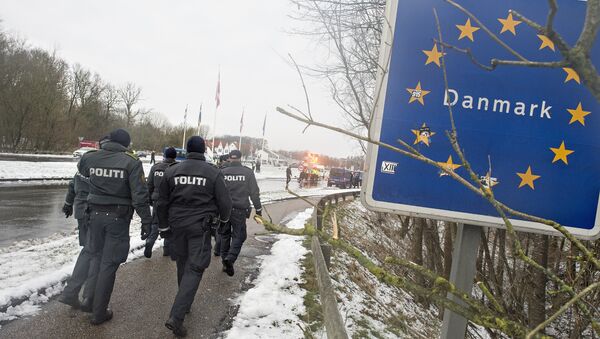Between September 7 last year and August 31, the Danish police spent 638,779 hours, including transport time, on border checks, which corresponds to 450 officers working full time and about five percent of the total police force of 9,000 men, Danish newspaper Politiken reported.
East and South Jutland Police have spent the most hours on border patrols (74,414 and 73,036 respectively). Remarkably, officers from Copenhagen Police have been excluded from the task as their focus has been rather on guarding Jewish institutions in the capital city in the wake of the terror attack in February 2015, when a young Jewish man was killed outside the Great Synagogue of Copenhagen.
"This puts the entire organization under strain. Over 10 percent of our employees are now working on tasks that we did not have back in 2014. This poses challenges, for when people are at the border, they cannot perform the tasks they have at home," Svend Larsen told Danish daily Berlingske.
Despite the criticism expressed, the temporary border controls will remain in place until November, when the issue is scheduled for parliamentary debate.
"The border controls have had a major preventative effect and helped to restore public order. Therefore, they must continue," Immigration Minister Inger Støjberg told Politiken.
"We now have a much longer response time to violent cases," Tom Steffensen from the North Zealand police union told Berlingske. "They are made to wait in favor of guarding the borders and the Jewish institutions. This frustrates us and violates our sense of justice."
Grænsekontrollen fortsætter trods faldet i asylansøgere. https://t.co/CJgU81Utot
— DANSK POLITI (@DANSKPOLITI) October 3, 2016
According to Justice Minister Søren Pind, the government took over a Danish police force thatwas "mangled to the bone." By Pind's own admission, the government has done the maximum to handle the challenges police face. Among other things, a total of 2 billion DKK extra was earmarked for the police in the period 2016-2019. Pind also reminded that he has been a vocal opponent of border controls, the Danish tabloid newspaper BT reported.
Last year, Denmark, a nation of 5.6 million, received over than 21,000 asylum seekers. The same year, the Danish government estimated that up to 25,000 asylum-seekers would come to Denmark in 2016, but the number has since been adjusted to 7,500. So far this year, 5,090 applied for Danish asylum, according to Immigration Ministry. As a consequence, a number of asylum accommodations have been closed down.






